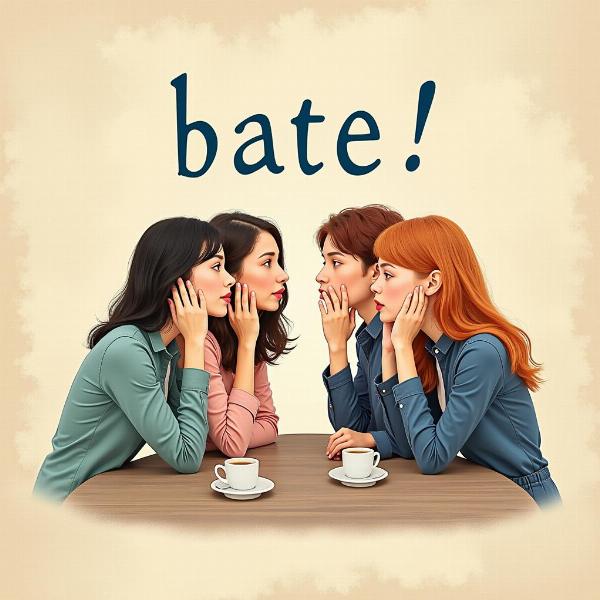Understanding the various meanings and nuances of “bate” (बातें) in Hindi is crucial for anyone seeking to grasp the intricacies of the language. While often simply translated as “things” or “matters,” “bate” carries a much richer and more nuanced meaning depending on the context. This article delves deep into the different interpretations of “bate,” exploring its usage in everyday conversations, literature, and various social situations.
Decoding the Many Faces of “Bate”
“Bate” is a plural noun derived from the singular “baat” (बात), which itself translates to “thing,” “matter,” “word,” or “talk.” The plural form expands upon this, often referring to multiple things, discussions, topics, or even gossip. The true meaning, however, depends heavily on the surrounding words and the overall context of the conversation.
For instance, “tumhari batein sun raha hun” (तुम्हारी बातें सुन रहा हूँ) translates to “I’m listening to your words/what you’re saying.” Here, “batein” refers to the words being spoken. However, “woh bade bade batein karta hai” (वह बड़े बड़े बातें करता है) means “He boasts/talks big.” In this case, “batein” signifies bragging or exaggerated claims.
Common Usages of “Bate” in Hindi
“Bate” finds its way into a plethora of Hindi phrases and idioms, each adding a unique layer of meaning. Let’s explore some common examples:
- Baatein karna (बातें करना): To talk, converse, or chat. This is perhaps the most straightforward usage, indicating a general exchange of words.
- Batein pakana (बातें पकड़ना): To nitpick or find fault in someone’s words. This implies focusing on minor details or misinterpreting statements to create conflict.
- Dil ki batein (दिल की बातें): Heartfelt words or intimate conversations. This phrase denotes sharing personal thoughts and feelings.
- Purani batein (पुरानी बातें): Old matters or past events. This usually refers to reminiscing about past experiences or discussing bygone times.
- Khaali batein (खाली बातें): Empty words or meaningless chatter. This suggests talking without substance or purpose.
“Bate” in Different Social Contexts
The interpretation of “bate” can also shift depending on the social context. For example, in formal settings, “bate” can refer to serious discussions or negotiations, as in “business batein” (business matters). Conversely, in informal settings, “bate” might signify gossip or casual chatter.
 Group of people gossiping
Group of people gossiping
“Bate” and its Literary Significance
In Hindi literature, “bate” often takes on a deeper meaning, representing profound thoughts, philosophical discussions, or even spiritual teachings. Poets and writers utilize “bate” to convey complex emotions and ideas, adding layers of symbolism and interpretation.
Dr. Anamika Sharma, a renowned Hindi linguist, states, “The beauty of ‘bate’ lies in its versatility. It’s a word that can capture the essence of everyday conversations as well as the profound depths of human thought.”
Conclusion: Understanding the Nuances of “Bate”
Mastering the meaning of “bate” in Hindi is essential for effective communication. By understanding its various uses and contextual nuances, you can navigate the complexities of the language and appreciate the richness of its vocabulary. Whether you’re engaging in casual conversation, reading classic literature, or navigating formal discussions, understanding the subtle shifts in meaning of “bate” will enhance your comprehension and expression.
FAQ
- What is the singular form of “bate”? The singular form is “baat.”
- Can “bate” be used to refer to objects? While “baat” can refer to a single object, “bate” generally refers to abstract concepts like conversations, matters, or topics.
- How do I know the exact meaning of “bate” in a sentence? The context of the sentence and surrounding words will dictate the specific meaning of “bate.”
- Is “bate” a formal or informal word? It can be both, depending on the context.
- Are there any other similar words to “bate” in Hindi? Words like “charcha” (discussion) and “gupshup” (chat) convey similar meanings, but with slightly different connotations.
- Can “bate” be used in a negative context? Yes, as in the example of “khaali batein” (empty words).
- Is there a difference between “baat” and “bate” when referring to conversations? “Baat” often refers to a single point or topic within a conversation, whereas “bate” generally encompasses the entire conversation or multiple topics.
Related Articles
Meaning-Hindi.in offers professional Hindi translation services catering to diverse needs, from business and legal documents to website localization and educational materials. Our expertise spans various fields, ensuring accurate and culturally sensitive translations. For all your Hindi translation needs, contact us at [email protected] or call +91 11-4502-7584. Meaning-Hindi.in is your trusted partner for bridging the language gap.